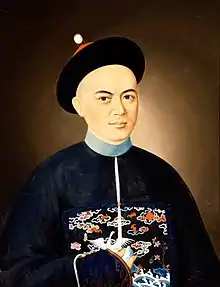
Spoilum (active 1765–1805; Chinese: 關作霖; pinyin: Guan Zuolin) was a Chinese artist active in Guangzhou between 1785 and 1810, during the Old China Trade. He was the earliest oil painter in Canton.[1] He painted portraits of Chinese and Western merchants and sea captains in the Western style painting with oil on canvas rather than ink on paper or silk in the Chinese style.[2] He created paintings of Chinese hong merchants Eshing (silk merchant) and Puan Kee Qua.[3] His portraits of Western merchants typically required a two- or three-hour sitting, and cost $10.[4] He also mastered the European technique of reverse glass painting. Little is known of his life, although he was one of a family of painters, including his grandson Lam Qua, and is said to have traveled extensively in the West.[5]
References
- ↑ Carbone, Iside (August 2002). Glimpses of China Through the Export Watercolours of the 18th-19th Centuries: A Selection from the British Museum's Collection (PDF) (Master thesis). University of London. S2CID 165867030.
- ↑ Corrigan, Karina. "A World of Connections at the Peabody Essex Museum". Antiques and Fine Arts.
- ↑ "MIT Visualizing Cultures". visualizingcultures.mit.edu. Retrieved 2019-11-17.
- ↑ Perdue, Peter C. "Spoilum (Guan Zuolin)". Rise & Fall of the Canton System. Retrieved 3 May 2014.
- ↑ Liu, Lydia H., ed. (1999). Tokens of exchange: the problem of translation in global circulations. Durham (N.C.): Duke University Press. p. 243. ISBN 978-0-8223-2424-9.
Further reading
- Perdue, Peter C. "Rise & Fall of the Canton System: III Canton & Hong Kong". MIT Visualizing Cultures. Massachusetts Institute of Technology. Retrieved 3 May 2014.
- "Spoilum's Lord Macartney painting could make $175,000". Retrieved 3 May 2014.
- Huang, Michelle (2014). The Reception of Chinese Art Across Cultures. Cambridge Scholars Publishing. pp. 33–34.